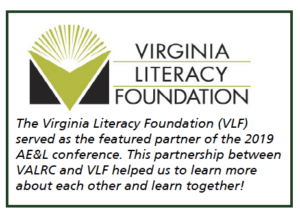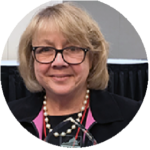Community-Based Literacy Organizations Find Professional Growth Opportunities at the AE&L Conference
by 2019 AE&L Conference Advisory Committee Member Victoire Gerkens Sanborn
“I especially enjoyed the opportunity to network with other CBLOs at the [AE&L] conference, to air challenges unique to CBLOs and share resolution ideas and resources.”–Joyelle M. Saunders, Executive Director, Peninsula READS

Since 2017, the Virginia Literacy Foundation (VLF) has actively focused on one of its prime objectives for community-based literacy organizations (CBLOs)—that of developing or identifying “innovative approaches and best practices to improve literacy instruction and strengthen delivery of literacy services.” The various ways the VLF achieves this objective include professional development (PD) and program improvement initiatives, which encourage CBLOs to help adult students achieve their literacy goals. In recent years, the VLF has partnered with VAACE (Virginia Association of Adult and Continuing Education) and this year with the AE&L Conference, sponsored by the VDOE (Virginia Department of Education, Office of Career and Technical Education) to promote partnership-building and increased professional development opportunities for VLF-funded programs.
While these partnership conferences typically attract the same number of CBLO staff and volunteers (around 50), opportunities for attending workshops have increased from an average of 12-17 workshops (VLF conference only) to 80 or more (partner conferences). This change has not only provided more workshops for staff and volunteers, but also increased occasions for them to meet people from a mix of statewide programs as well as view resources from a variety of vendors. The overall reactions to the partnership conferences has been positive.
When speaking about the 2019 AE&L Conference in particular, Lisa Harris, a long-term program coordinator from Literacy Volunteers of Campbell County Public Library remarked
“As a staff member of a small CBLO (two members strong!), there is often little time to stop and reflect on how we do things in our organization and areas where we can improve. The conference workshops provide valuable information about topics relevant to us. My colleague and I will attend different classes, so in the evening and on the drive home, we share what we have learned with one another. If we come away with at least one good idea to incorporate into our everyday practices, then we consider the conference time well spent. I love workshops focused on the heart of our organization…our volunteers! I found several take-away ideas in Jen Mora Zuniga’s Increasing Board Engagement and Ellen Osborne’s Satisfaction Guaranteed: Let’s Keep Our Volunteers on the Job.”
Joyelle M. Saunders, the Executive Director (E.D.) at Peninsula READS since January, and an experienced grant writer, fundraiser, and E.D. at other nonprofits, found networking with E.D.s from literacy programs and regional program managers extremely valuable. She notes that
“As a fairly new executive director of a CBLO, I’m beginning to understand that expanding our community impact will only happen as we expand our partnerships with adult education and other comparable agencies to serve those low-level literacy learners whose skill level leaves them just out of the range of eligibility for programming offered by our partners. I found the AE&L Conference to be quite valuable to our partnership efforts. It afforded me the opportunity to learn about various programs, policies and trends affecting our partners and to brainstorm ways we as a CBLO can support low-level literacy learners, serving as a bridge to higher level programming that will help them reach their educational, employment, and general lifestyle goals. I especially enjoyed the opportunity to network with other CBLOs at the conference, to air challenges unique to CBLOs and share resolution ideas and resources.”
The CBLO Think Tanks that were scheduled at the end of Wednesday’s and Thursday’s workshops were well attended and replete with lively discussions, resource sharing, and insights. By the end of the second Think Tank, it was clear that participants had exchanged contact information and considered each other “comrades-in-arms.” Ned Stewart, the new director from Charlotte Adult Learning Center, summarizes his experience:
“When I went to the AE&L Conference, I was only a couple of weeks into the job as Executive Director of my local organization. It turned out to be a great coincidence. The conference helped me define more precisely in my mind what our organization should be/could be doing. This was most helpful. But the most helpful thing happened the last day of the conference. Several of my tablemates and I realized that we all had been in most of the same breakout sessions together, which meant we probably were facing similar circumstances back home. Since the others were more experienced administrators from larger, more developed centers, I knew that I would be calling the telephone numbers I harvested pretty regularly.”
To learn more about the Virginia Literacy Foundation and its support of the AE&L Conference, visit the AE&L Conference website.

Victoire Gerkens Sanborn is a Literacy Consultant with the Virginia Literacy Foundation. She is a valued specialist in the literacy field who facilitates workshops in grant writing, strategic planning, train the trainer, board development, marketing and outreach, tutor training, technology training, and reading comprehension strategies.